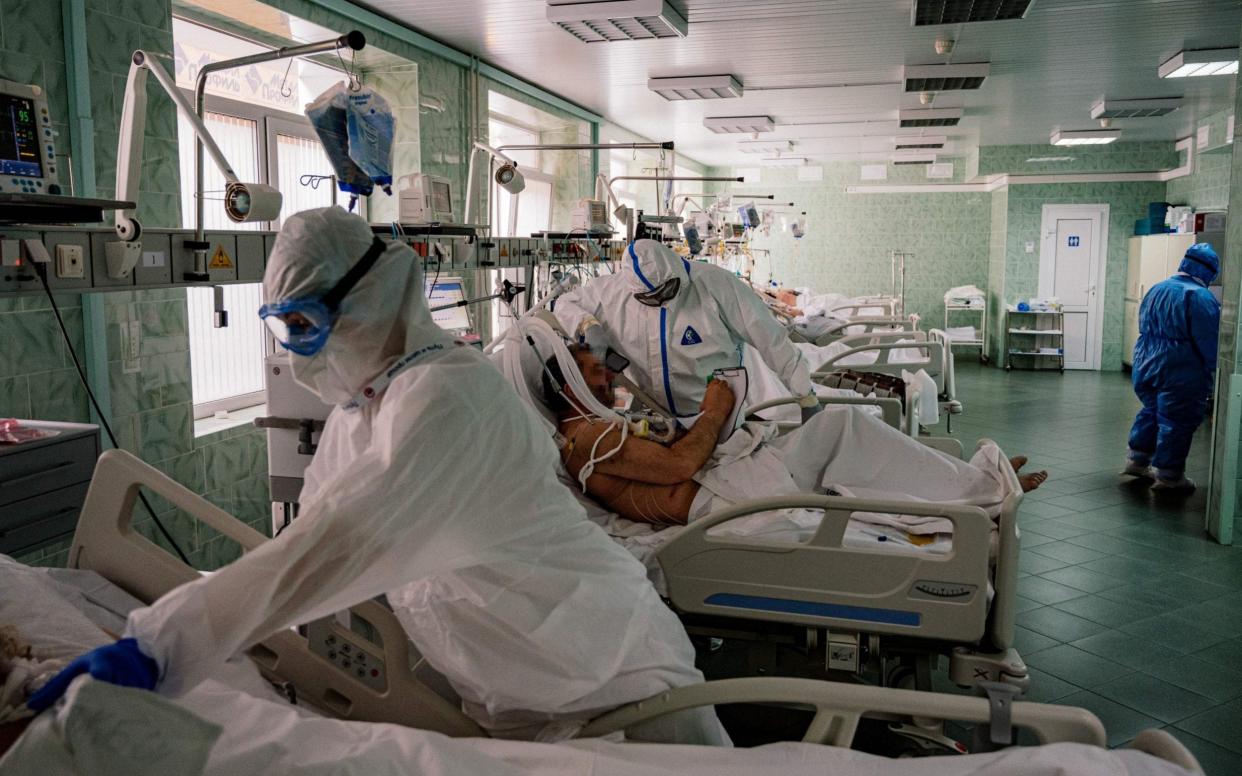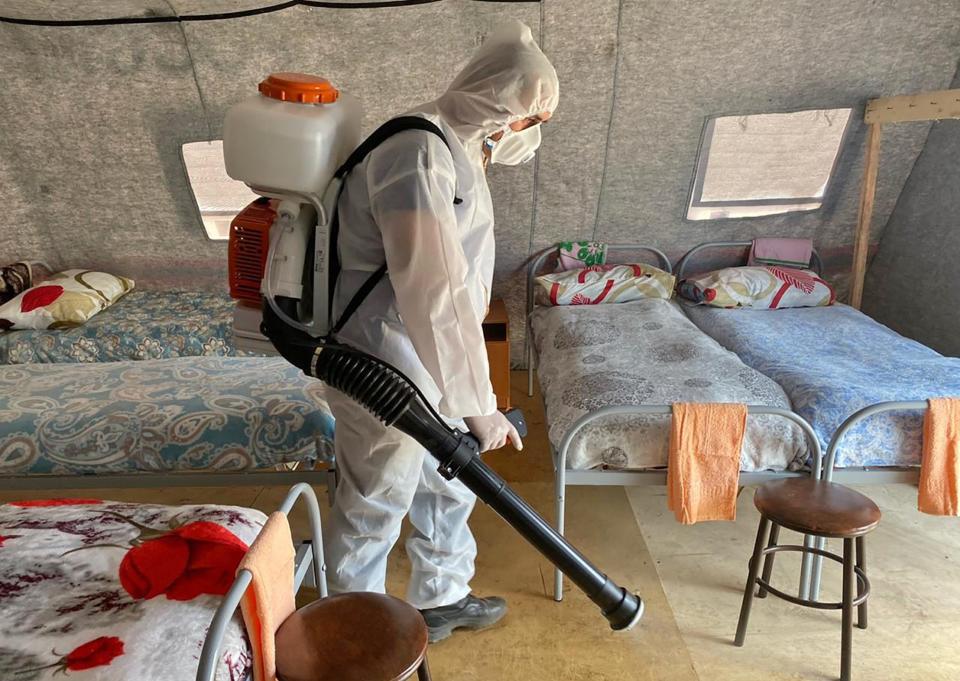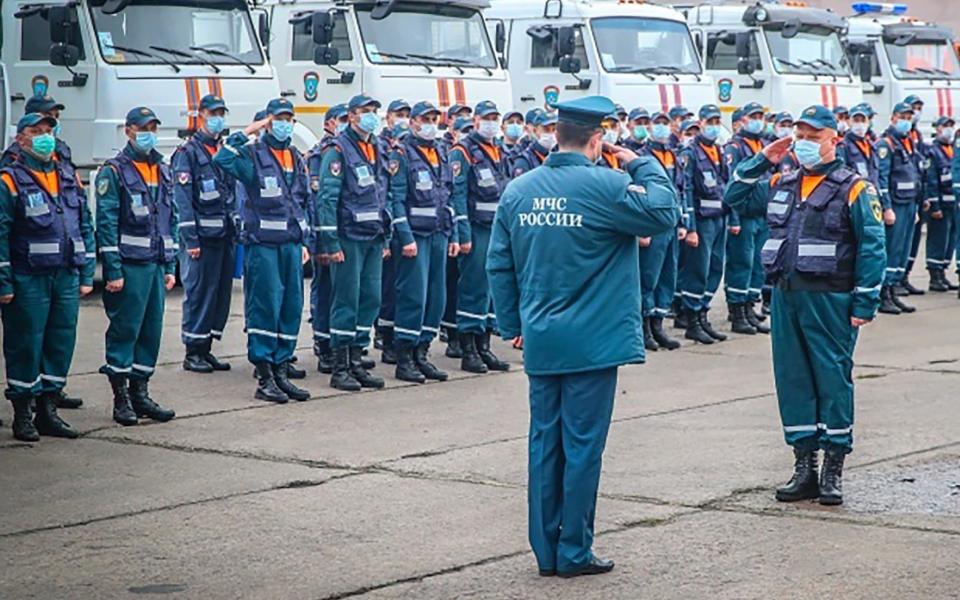Putin pledges aid to Russia's Dagestan region hit by coronavirus 'catastrophe'

Coronavirus has brought “catastrophe” to one of Russia’s most populated regions, forcing President Vladimir Putin to pledge unprecedented aid.
The outbreak in the mountainous region of Dagestan, where Covid-19 has reportedly claimed up to several hundred lives, has shed light on the chronic under-funding of Russian provincial hospitals where intensive care units were overrun in a matter of days. Health care workers are said to be dying in thier droves because of a lack of personal protective equipment.
One week after he announced the end to nationwide coronavirus lockdown, Mr Putin acknowledged that the outbreak in Dagestan is so dire that it needs “an emergency response”. He pledged funds and aid from the military.
As emergency responders were setting off for Dagestan on Tuesday, Mikhail Mishustin, the Russian prime minister, was discharged from hospital. He had spent three weeks there with coronavirus.
Nearly 700 people have died of pneumonia in Dagestan, according to local health officials. But just 32 of the fatalities have been attributed to coronavirus in the outbreak described by the region’s top Muslim cleric as a “catastrophe”.
Scientists have cast doubt on Russia’s low death count, which stood yesterday at 2,837. They point to the country’s conservative approach to attributing fatalities to Covid-19, and they suspect under-reporting.

Dagestan, a region of three million people, turned out to be the perfect breeding ground for an epidemic. Its health care is one of the country’s worst-funded, and people typically live in large, close knit communities.
Dr Ibragim Yevtemirov, from the town of Khasavyurt near Chechnya, describes how his hospital got “overrun with patients” in a matter of days in mid-April. Local traditions made a bad situation worse.
“We were losing five-six people a day... and every person who died triggered a new wave of patients: people would gather for the wake, infecting each other,” Dr Yevtemirov said.
The doctor himself had to plead with his family members including an elderly aunt to self-isolate and bolt her front door to keep away guests, which is almost a cardinal sin in the North Caucasus where hospitality is considered one of the main virtues.
Like at the majority of Dagestan’s clinics, PPE at Mr Yevtemirov’s hospital was hard to come by before local volunteers and tycoons chipped in to help.
The lack of protection has exposed many medics to mortal danger.
Last month, Dr Yevtemirov, a pediatric orthopedist who sent his wife and two children to a mountain village before the outbreak began, fell ill with Covid-19 symptoms but he has not got tested yet. Four weeks later, he still has a cough:
“I think everyone’s had it by now,” he told the Telegraph speaking of his colleagues. “I don’t know anyone who hasn’t been ill.”
With just 32 coronavirus deaths officially reported in the region, Dagestan’s health minister said on Sunday that 40 health care workers have died of Covid-19 and pneumonia.
His press office later issued a statement, specifying that “not all of them have died of coronavirus and pneumonia, there were other diagnoses.”
Ziyatdin Uvaisov, who runs Patient Monitor, a Dagestani NGO that has been raising funds for medics, says the coronavirus death toll among the region’s health care workers is beyond alarming.

“Our biggest problem is the huge number of medics who have died,” he told the Telegraph. “We can explain such a high mortality rate by the lack of early diagnostics, the fact that tests are not performed.”
Dr Yevtemirov supported Mr Uvaisov's claim that many local hospitals do not test their staff once a week as recommended by federal authorities.
Dagestan performs just 1,500 tests a day, according to health officials, which would barely cover health care workers. Moscow with four times the population performs more than 40,000 tests per day.
Six medics have died in Mr Yevtemirov’s hospital including a nurse who passed away on Monday, he said, indicating that the death toll of 40 people could be a low estimate.
Russian health authorities have not provided the tally of deaths among medics but Moscow doctors have been compiling a list of their own, drawing on reports from across the country.
The number of fatalities, documented by the online project Memorial List shows that at least one in every 15 coronavirus deaths in Russia is a health care worker.
Russian media outlet Media Zona said in an investigation on health care workers’ fatalities that came out on Tuesday that it independently confirmed 186 deaths, which, according to them, means that Russia has the world’s largest number of fatalities among medics compared to the overall death toll, which would be four times as high as in Iran.
The latest data suggest that health care workers account for less than 1 percent of all coronavirus deaths in the UK, Italy, Spain or the United States. In Russia, it is 7 percent, which can be either explained by dismal working conditions or wide under-reporting of deaths.
In Moscow, Prime Minister Mikhail Mishustin, who was discharged from hospital on Tuesday after spending more than 20 days in a coronavirus ward, thanked Russian health care workers for their “valiant work.”
Back in Dagestan, Dr Yevtemirov speaks cautiously about a decrease in new hospitalisations in recent days while his hospital “is still running at its limit.”
With the end of Ramadan coming up on Saturday, medics in this largely Muslim region are dreading public celebrations, fearing that communities would be tempted to flout lockdown restrictions and host traditional parties marking the main holiday in Islam.
Crowds of shoppers that Dr Yevtemirov saw at a local outdoor market on Tuesday morning do not make him optimistic.
“Looking at how people are cleaning up their homes, painting the gates, I think many will be receiving guests,” he said.
“People know that it’s dangerous but they will not have the full understanding until it affects them personally, until their family member dies.”

